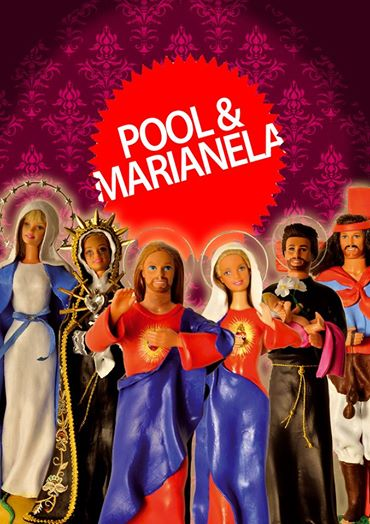"There is something Mary-like about Barbie. The Virgin Mary is a feminine ideal thought up by men, created, so to speak, by the clerical puppet troupe in the church boardroom"
Blockbuster in pink and bitterly wicked gender satire
Barbie, Mary and the Catholic "women's issue"
For weeks, Barbie has been filling the cinemas as the perfect summer blockbuster. But behind the pink plastic façade a bitterly nasty gender satire flashes up. And in some places, Catholic women recognise themselves.
"I am a man without power, does that make me a woman?" Words from a man-man that come as a shock to Barbie. Because in her pink doll cosmos, women are of course in charge. Even more: "Thanks to Barbie, all the problems of feminism have been solved," she believes. A fatal error, as she learns in the human kingdom. - This is the setting of the "Barbie" film.
For weeks, Greta Gerwig's blockbuster has been creating hype, "Barbie-Core" is the fashion trend of 2023, even furniture stores offer collections in squeaky pastel. Allegedly, women separated from their "Kens" after the film because it opened their eyes about patriarchy. It is banned in some Muslim countries "because of homosexual innuendos", as well as in parts of Southeast Asia because it briefly shows the controversial "Nine-Dash-Line" sea map with territorial claims by China. But for the vast majority of people it is one thing above all: good entertainment - albeit with unexpected depth.
"A positive surprise for a summer blockbuster".
"I was pleasantly surprised by how funny and political the film is - and that it deals with currents of feminism," says journalist Christiane Florin. "It makes you think," says the book author ("Women's Uprising") and religion expert for Deutschlandfunk. Media ethicist, philosopher and Catholic theologian Claudia Paganini takes a similar view: "For me, the film is a relatively profound and also wicked social satire - if you are prepared to look not only at the superficial 'pink level'," says the professor, who has been teaching feminist philosophy at various universities for ten years: "For a summer blockbuster, a positive surprise."
"It is incomprehensible to me that highly qualified women theologians still allow themselves to be demoted to arranging flowers at the altar. That is simply unbearable."
- Quote: Claudia Paganini
It all starts when Barbie (Margot Robbie) notices disturbing changes: she can no longer walk on tiptoe, has thoughts of death and discovers cellulite on her perfect body. The reason: apparently her human owner is in a crisis. Barbie sets off into the real world - together with her dimwitted beau Ken (Ryan Gosling) - to find the owner and restore the happy status quo.
But while Barbie experiences only ridicule and hatred from the humans and faces a ridiculous male crowd in the plastic doll parent company, Ken discovers the sides of the patriarchy that are agreeable to him: he transforms Barbieland into his macho paradise "Ken-dom". And Barbie's comrades - previously president, Nobel laureate, astronaut or chief physician - are suddenly brainwashed fools who like to serve the men.
An absurd exaggeration, but one that will make some female cinema-goers stop laughing. Theologian Paganini feels reminded of the role of women in the Catholic Church: "It is incomprehensible to me that highly qualified female theologians still allow themselves to be demoted to arranging flowers at the altar. That is simply unbearable," the professor said. "There is no argument whatsoever in the Bible for this unequal treatment of women; it is based purely on tradition."
"There is something Mary-like about Barbie. The Virgin Mary is a feminine ideal thought up by men, created, so to speak, by the clerical puppet troupe in the church boardroom," says Christiane Florin.
Cathcon: If you believe this, don't even think you are Catholic
Christiane Florin, known for her critical attitude towards the church's handling of the "women's question", even sees parallels to the Virgin Mary: "Barbie has something Mary-like about her. The Virgin Mary is a female ideal invented by men, created, so to speak, by the clerical puppet troupe in the church boardroom. And Barbie, too, with her perfect measurements and grandiose occupations, embodies an image of woman against which the real female human being must fail. So whether pure virgin maid or asexual supermodel, it's always an ideal that real women measure up to."
"Reality rarely adapts to our dreams"
Very aptly, she finds the words of Barbie's new human friend Gloria (America Ferrera), who feels extremely pressured: "It's literally impossible to be a woman, we always do something wrong." Women are supposed to be skinny but not too skinny, have money and be good but not show off. And to be grateful all the time. What women in the church can perhaps learn from Barbie? "That this hoping for male enabling, this saying 'please, please', doesn't help," she says: "You have to get out of this concept of granting, asking and being grateful for the places men give women, otherwise nothing changes."
In the end, the Barbies manage to abolish patriarchy and regain their competence - thanks to man-woman Gloria, who opens their eyes, and their own cunning: they make the men realise that they don't want so much power in the first place. Or as Ken puts it, "When I realised the patriarchy wasn't about horses at all, I lost interest." He now wears a T-shirt that says "I'm KENough (enough)." Ultimately a Hollywood ending, Claudia Paganini thinks: "In a way, the Barbie film is also a beautiful fairy tale. And reality rarely adapts to our dreams."










.jpeg)

Comments